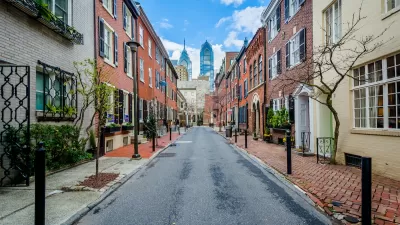Calgary has the largest ecological footprint of any large Canadian municipality. The city council is trying to fix that history with Plan It Calgary, a new land use and transportation plan- and developers are none too pleased.
In response to Plan It Calgary, developers have formed the Industry Champions Committee (ICC) and released a report of their own.
"According to the report, 'the industry believes complete communities are already being developed and built.' It reads like complete denial. Though the population density of new communities has increased to six to eight units per acre from three to four units per acre, Sustainable Calgary (an organization that promotes sustainable community initiatives) recommends 14 to 20 units per acre.
The heart of the argument put forth by the ICC is that by building a more compact and sustainable city, we are putting Calgarians' freedom of choice and quality of life in 'peril.' A more compact city, though, will not reduce but increase choice for consumers. You would be able to choose to walk, bike, skate, take public transit or use your automobile to get where you want to go in a timely manner. Currently, in most residential communities, you have little choice but to drive. Experiencing road rage and spending endless time in traffic jams by yourself in your emissions-spewing car lowers your quality of life. Compare this to walking to your destination, getting exercise, talking to your neighbours on your way, smelling the flowers and enjoying the fresh air. Basic amenities need to be built closer to where you live, so you don't have to travel so far in the first place.
The other main argument put forward against Plan It is cost. According to the ICC, consumers want single detached homes at an affordable price. The problem with this argument is that those who live in them are not paying the full cost of suburban homes."
FULL STORY: A more sustainable Plan It

Planetizen Federal Action Tracker
A weekly monitor of how Trump’s orders and actions are impacting planners and planning in America.

Chicago’s Ghost Rails
Just beneath the surface of the modern city lie the remnants of its expansive early 20th-century streetcar system.

San Antonio and Austin are Fusing Into one Massive Megaregion
The region spanning the two central Texas cities is growing fast, posing challenges for local infrastructure and water supplies.

Since Zion's Shuttles Went Electric “The Smog is Gone”
Visitors to Zion National Park can enjoy the canyon via the nation’s first fully electric park shuttle system.

Trump Distributing DOT Safety Funds at 1/10 Rate of Biden
Funds for Safe Streets and other transportation safety and equity programs are being held up by administrative reviews and conflicts with the Trump administration’s priorities.

German Cities Subsidize Taxis for Women Amid Wave of Violence
Free or low-cost taxi rides can help women navigate cities more safely, but critics say the programs don't address the root causes of violence against women.
Urban Design for Planners 1: Software Tools
This six-course series explores essential urban design concepts using open source software and equips planners with the tools they need to participate fully in the urban design process.
Planning for Universal Design
Learn the tools for implementing Universal Design in planning regulations.
planning NEXT
Appalachian Highlands Housing Partners
Mpact (founded as Rail~Volution)
City of Camden Redevelopment Agency
City of Astoria
City of Portland
City of Laramie





























